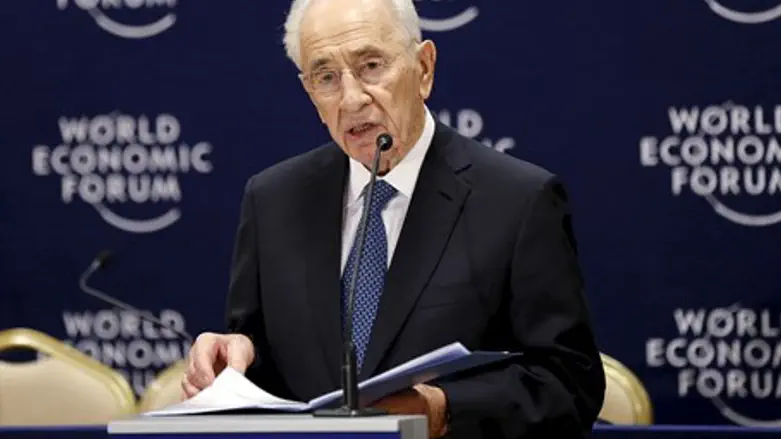
Former President Shimon Peres visited Jordan on Friday, where he claimed that that there is a “clear majority” in Israel for the so-called “two-state solution”.
Addressing reporters on the sidelines of the World Economic Forum and quoted by Jordan’s official Petra news agency, Peres called on all stakeholders to support on one hand the renew of the negations for peace.
"The Middle East is going through a complicated situation," he said, calling to take advantage of new opportunities that arise.
"In Israel there is a clear majority for the two state solution," Peres declared, adding that there is no better alternative and that the peace negotiations can be resumed.
“It is impossible to freeze reality and the status quo is not a real option,” he said.
“There was a time when peace with Jordan and Egypt was a dream. Today it is a reality. We greatly value the peace agreements with our neighbors. They have allowed us to live in peace, side by side, through the challenging realities of our region," the former Israeli president said.
If the countries in the Middle East would enter the global economy, he said, they take advantage of its offers in business, technology, development, and industry.
"I believe that today’s Middle East can offer cooperation for progress, for hope, against extremism and bloodshed. Together, we can make our region more promising, more peaceful, more fruitful," Peres concluded.
In recent weeks, since the new Israeli government was formed, there has been renewed pressure on Israel to resume talks with the Palestinian Authority (PA) on the basis of the two-state solution.
Among those who have called on Israel to commit to the two-state solution are, among others, the European Union’s Federica Mogherini and UN chief Ban Ki-moon.
U.S. President Barack Obama has also called on Israel to resume talks, saying last week the United States still believes Israel's long-term security is best served by reaching an agreement to live alongside a recognized Palestinian state.
When he was president, Peres repeatedly made statements that are contrary to the views of Israel’s elected government, despite the fact that Israel's president's role is defined as ceremonial and apolitical.
Four years ago it was revealed that Peres and PA chairman Mahmoud Abbas had held four secret meetings in a bid to revive stalled peace talks and, last year, Peres claimed that he had reached a peace agreement with Abbas but Prime Minister Binyamin Netanyahu would not allow it to go through.
(Arutz Sheva’s North American desk is keeping you updated until the start of Shabbat in New York. The time posted automatically on all Arutz Sheva articles, however, is Israeli time.)
